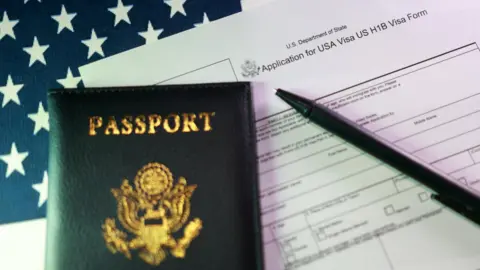

Mr Singh, a software engineering manager based in the Seattle area, knew that his employer - a US startup - would not be in a position to pay the fee on top of his current salary.
Mr Singh, who has been working in the US for ten years - the last seven of them on a H-1B visa - breathed a slight sigh of relief when the White House clarified on Saturday that for now, the fee only applies to future applicants.
But his worries are an indication of the potentially far-reaching consequences of the change, as it creates new burdens for businesses, especially startups, with what some say could be significant fallout for innovation and economic growth.

The H-1B programme is often associated with the giants of the US tech sector. Amazon tops the list of beneficiaries, with more than 10,000 H-1B visas approved in the first half of 2025. Microsoft, Meta, Apple and Google each secured more than 4,000 visas through the programme through June.
None of the companies responded to requests for comment.
But while just 30 employers - mainly big tech companies - dominate the programme, accounting for an estimated 40% of the new H-1B visas available, it is not just the behemoths that are poised to be affected by Trump's executive order.
Startups, as well as smaller firms beyond tech, also employ workers through H-1B visas. For them, a six-figure fee per applicant could be crippling.
"If you're a startup with new technology, and you've got some venture capital money but you're worried about burning through it too quickly, this could kill you," said John Skrentny, a professor at the University of California, San Diego who studies STEM workforce development.
"What the Trump administration's plan doesn't seem to acknowledge is that not every company can spend $100,000 on a visa," he added.
Beyond the technology industry, organisations in industries such as education and healthcare, both of which employ foreign skilled workers through the H-1B programme, are also grappling with what the six-figure fee might mean.
"There's no way that we can afford $100,000," said Karen Brady, the chief executive at Ryther, a behavioural health nonprofit based in Seattle. "In terms of future hiring, we won't be doing any more H-1B visas."
The behavioural health sector has been grappling with a workforce shortage amid a spike in need since the pandemic, Ms Brady said. Hiring employees through the H-1B programme has helped address the crisis, she said.
Ryther, based in Seattle, currently employs two therapists on H-1B visas, out of 45 total, Ms Brady said, both of whom are from China. Without those employees, there would be nobody on staff with the linguistic and cultural knowledge to communicate with families from similar backgrounds.
"They match some of our clients in a way that American workers don't," she said. "I can't replace that."

In a research note, Atakan Bakiskan, an economist at the investment bank Berenberg, lowered his estimate for US growth from 2% at the start of the year to 1.5%, saying said the $100,000 H-1B fee is part of the Trump administration's broader "anti-growth policymaking".
"With the new H-1B policy, the labour force is more likely to shrink than expand going forward," he said. "The brain drain will weigh heavily on productivity."
'A great solution'
In his executive order, Trump justified the new fee by referring to "abuse" of the H-1B programme, a nod to longstanding concern across the political spectrum that companies have used the programme to hire foreign staff at lower wages.
His administration is also working on a wider overhaul of the programme, which is typically overwhelmed by applications for the roughly 85,000 new visas available each year, including a proposal to prioritise applications for higher paid workers.
Trump's initial announcement won praise from some, including Netflix co-founder Reed Hastings, who broke from many of his fellow tech leaders, calling the fee a "great solution".
Supporters of the change have said the major tech companies, like Amazon and Microsoft, that are the biggest beneficiaries of the programme, have the money to swallow the new charge.
"If these are really specialised people, and they're bringing in a lot of value, $100,000 shouldn't be a big deal for those employers," said Ronil Hira, a political science professor at Howard University who focuses on US immigration policy.
But policies that make it harder for companies to hire skilled positions also often prompt firms to offshore their operations, rather than hire US workers at an equivalent skill level, said Dan Wang, a professor at Columbia Business School focused on global migration and entrepreneurship.
"These policies really don't have the intended effect of balancing the labour market competitiveness of American workers," Prof Wang said. "There's not a trace of data that suggests that American workers would benefit from this."
Elise Fialkowski is co-chair of the corporate immigration practice at Klasko Immigration Law Partners, which works with both startups and larger corporations.
She said since last week, some of her larger corporate clients - many of which already have subsidiaries or branch offices outside the US - have started to ponder whether to hire talent in Canada, the UK and elsewhere instead.
Trump's executive order "almost begs companies to offshore work", she said.
Despite the reprieve, Mr Singh said he was still considering leaving his startup if he could find a job in his home country of India, or elsewhere - Canada, Japan, South Korea - worried the administration will continue to harden policies against immigrants.
"There's uncertainty now that anything can happen in the future," Mr Singh said. "If we are forced out, then that's the only option we're left with."